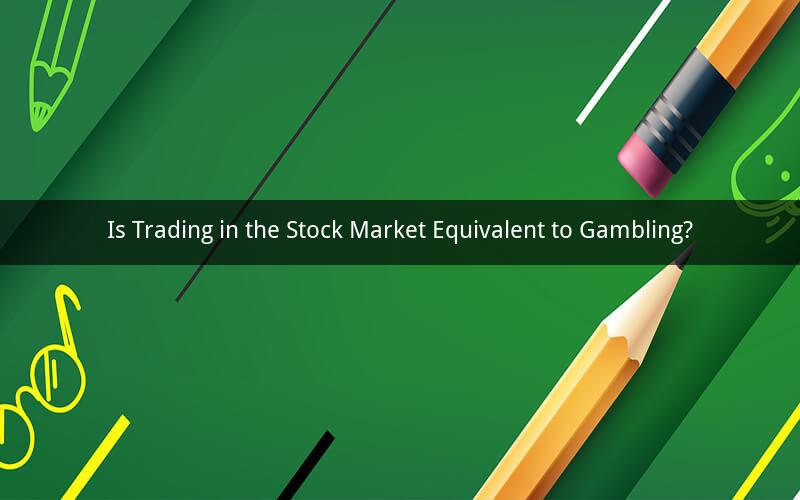
The stock market, a vast playground for investors, has always been a subject of debate and controversy. One of the most common questions that arise is whether trading in the stock market is equivalent to gambling. While both involve risk and the potential for high returns, the underlying nature and strategies employed in each differ significantly. This article aims to explore the similarities and differences between trading in the stock market and gambling, shedding light on the complexities involved in both.
1. Risk and Reward
One of the primary reasons why trading in the stock market is often compared to gambling is the risk and reward aspect. Both activities involve the potential for high returns, but they also come with a significant amount of risk. In both cases, the outcome is uncertain, and the investor/gambler must be prepared to face the possibility of losing their investment.
In the stock market, risk is mitigated by thorough research, analysis, and diversification. Investors can study financial statements, analyze market trends, and consider various factors such as company performance, economic indicators, and industry trends before making investment decisions. This research-driven approach helps investors to make more informed choices and minimize the risk of losses.
On the other hand, gambling is based on chance and luck. Gamblers rely on intuition, hunches, or random events to guide their decisions. While some gamblers may use strategies or systems to increase their chances of winning, the overall outcome is still largely unpredictable.
2. Skill vs. Luck
Another key difference between trading in the stock market and gambling lies in the role of skill versus luck. In the stock market, successful investors often possess a combination of knowledge, experience, and discipline. They learn about various investment strategies, market dynamics, and risk management techniques. This skill set enables them to make more informed decisions and adapt to changing market conditions.
In contrast, gamblers rely heavily on luck. While some may have a knack for gambling and consistently win, the overall success of a gambler is often attributed to chance rather than skill. This is not to say that gamblers cannot be successful; however, their success is often short-lived and not sustainable in the long run.
3. Timeframe and Commitment
Trading in the stock market requires a significant amount of time, effort, and dedication. Successful investors often spend hours researching, analyzing, and monitoring their investments. They are committed to staying updated on market trends, economic news, and company developments. This long-term perspective helps them to navigate market volatility and make informed decisions.
Gambling, on the other hand, can be a short-term activity. Gamblers may participate in a game of chance for a few minutes or hours, without the same level of commitment required by stock market investors. While some gamblers may develop a long-term strategy, the overall timeframe is typically much shorter compared to stock market trading.
4. Social and Economic Impact
Trading in the stock market has a significant impact on the social and economic landscape. Successful investors can contribute to economic growth, create jobs, and generate wealth. Additionally, stock market trading provides a platform for companies to raise capital and expand their operations.
Gambling, on the other hand, can have negative social and economic consequences. Problem gambling can lead to financial distress, addiction, and social isolation. While some individuals may enjoy gambling as a form of entertainment, it is important to recognize the potential risks associated with this activity.
5. Conclusion
In conclusion, while trading in the stock market and gambling share some similarities, such as risk and the potential for high returns, they differ significantly in terms of skill, strategy, and long-term commitment. Trading in the stock market requires knowledge, research, and discipline, while gambling is often based on luck and intuition. As investors, it is crucial to recognize the differences between these two activities and approach them with a well-informed perspective.
Questions and Answers:
1. What is the main difference between trading in the stock market and gambling?
The main difference lies in the role of skill versus luck. Trading in the stock market requires knowledge, research, and discipline, while gambling is based on chance and luck.
2. Can trading in the stock market be considered a form of gambling?
No, trading in the stock market cannot be considered a form of gambling. While both activities involve risk, trading in the stock market requires knowledge, research, and discipline, which are not present in gambling.
3. How can investors mitigate the risk of trading in the stock market?
Investors can mitigate the risk of trading in the stock market by conducting thorough research, diversifying their investments, and setting realistic expectations.
4. What is the potential social and economic impact of trading in the stock market?
Trading in the stock market can have a positive social and economic impact by contributing to economic growth, creating jobs, and generating wealth.
5. Can gambling be a source of income for individuals?
While gambling can be a source of income for some individuals, it is often considered an unreliable and unsustainable form of earning money.